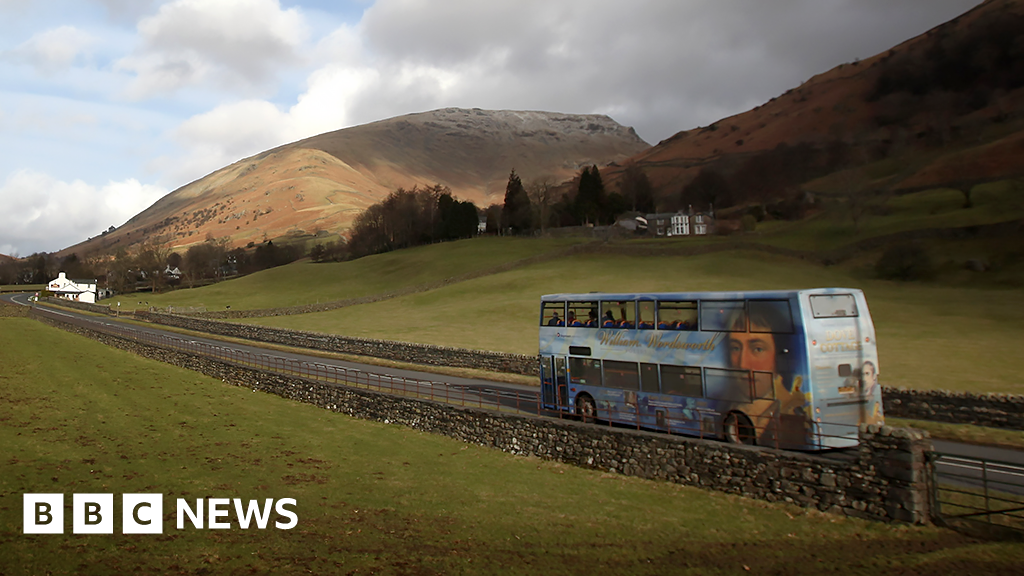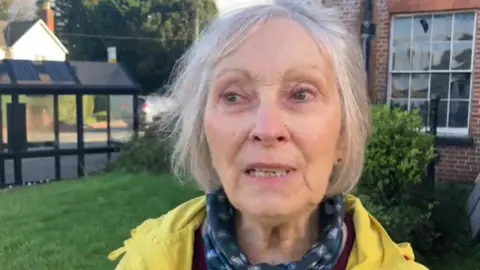 BBC
BBCThe 12:40 bus has just driven past Janette Ward’s stop seven minutes early as she watches from the other side of the road, waiting to cross. There won’t be another for two hours.
“It makes it very difficult when you’re going for an appointment or you’re connecting to a rail service or other bus service,” says Ms Ward, 74.
There’s also been further changes to make her journey more complicated, she says. Janette now has to take four buses to see her daughter in Stroud, Gloucestershire. Before, she only needed to change buses once.
Her situation is by no means unique.
The frequency of rural bus services in England has reached a historic low, according to a report by the County Councils Network. They found more than a quarter of rural routes had been lost over the decade to 2023.
And last week’s UK Budget revealed that the £2 cap on bus fares in much of England will increase by £1. It could mean an extra £40 a month for someone who gets a return five days a week.
Since then dozens of people have got in touch with BBC News, many saying that buses remain fundamentally unreliable.
Some passengers say there’s a lack of digital screens at bus stops and live app updates for some routes outside of cities, unlike trains and Ubers where many are used to tracking journeys in real time.
And even where tracking exists, it can sometimes be out of date.
Take Leeds, for example, where some locals claim they’ve had to endure “ghost buses” – they’re advertised as coming on live displays at bus stops, but never do.
“For people who rely on the bus as their only means of getting to work it’s impossibly frustrating,” says Cllr Eleanor Thomson, who runs a Facebook group for bus passengers in the Yorkshire city.
“Some people in the area have moved because they’re that fed up of it, or they’ve bought a car, which is costing them a lot of money.”
Bus operators told the local authority in January they’re installing 4G technology to improve tracking, but Cllr Thomson says it “doesn’t seem to be getting any better”.
‘Poor technology’
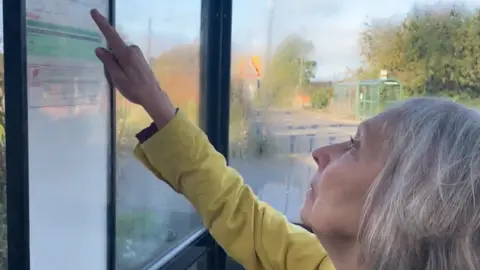
Janette has similar experiences of unreliable service updates in Hereford.
“On bank holidays, sometimes the tracking service doesn’t know if a bus is coming at all,” she says.
Campaigners think bringing the entire bus network into the 21st Century would give people more confidence in the service and make them more likely to use it.
“If you know that your bus is coming in five minutes, then you know you have that certainty,” says Silviya Barrett, director of policy and research from the Campaign for Better Transport.
“Whereas in some bus stops there isn’t even the basic timetable, let alone the live arrival updates.”
Cost concerns
Doreen Gower, who doesn’t drive, uses the bus regularly to attend hospital appointments in Hereford.
Now that her service only runs once every two hours, she feels she sometimes has to find alternatives because of the inconvenience.
“If you’re not feeling very well, you don’t particularly want to have to wait for another two hours for a bus. It means that I maybe have to pay £25 for a taxi to get me home,” she tells us.
She also relies on volunteers, who provide a ring-and-ride service, to bring her to and from her local GP surgery in a neighbouring village around 20 minutes away.
As well as passengers, poor rural bus services are costing employers.
“It’s pretty grim, some businesses are completely cut off from public transport,” says Natalie Fryer, who has been appointed by Cumbria’s tourism board to improve the situation.
“Employees are walking down dark roads from their closest bus stops or train stations, with employers concerned for their safety. Some businesses say they put up staff in their own homes just so they can stay open.”
In an attempt to work around the problem, Gilpin Hotel, which lies in the heart of the Lake District, spends £8,000 per month on taxis bringing some of its 137 staff to and from work. Many don’t drive, a common occurrence in the hospitality sector.
Helen Tappenden, who oversees personnel at the hotel, says the business has to “put our hand in our pocket” to avoid recruitment and retention problems.
“For our staff it can feel very isolating because, while they might love working here, without a bus route they struggle to have some normality – like popping to a coffee shop or a cinema,” she tells the BBC.
And 40 miles away at Muncaster Castle – which is popular with visitors and wedding guests – Ewan Frost-Pennington lets some staff stay in a house on the grounds because of the lack of transport connections.
“That’s got six young people living in it, of which I think two can drive,” says Ewan, whose family have lived in the castle for 800 years.

A franchised solution?
The UK Government insists it recognises the current service offered by bus operators is unsatisfactory for many passengers – particularly in rural areas and it will introduce a new law to address that.
Officials say the forthcoming buses bill will allow councils in England to deliver better services as they could choose to take control of them.
Under this franchising system, councils could be able to decide routes, timetables and fares – with operators bidding to run services for a fixed fee.
In London and Greater Manchester, where this system is active, bus fares will remain capped at £1.75 and £2 respectively after the new England-wide cap rise – and some passengers told the BBC they felt this risked widening regional inequality.
But experts warn this kind of system is not suitable for all communities and that it works best when a council area includes both urban and rural parts.
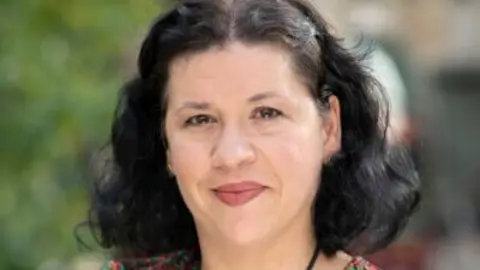 Campaign for Better Transport
Campaign for Better Transport“The benefit is that if you have both of these, the more profitable ones in urban areas can pay for the services in rural areas,” says Silviya.
She adds that another reason why some councils may choose not to operate a franchised bus system is that they no longer have the expertise. ”They haven’t managed buses to this extent since privatisation,” she says.
In 1986, services outside of London were deregulated and privatised. Before then most bus services were operated by publicly owned companies, which were often run by councils.
Some experts say bus services would also be made better if the way they are funded was made simpler – as currently there are six separate pots councils can apply to for money.
“Streamlining bus funding into a single, long-term pot would give councils greater control over services and spending and residents more long-term certainty over future services,” says Cllr Adam Hug, transport spokesman for the Local Government Association.
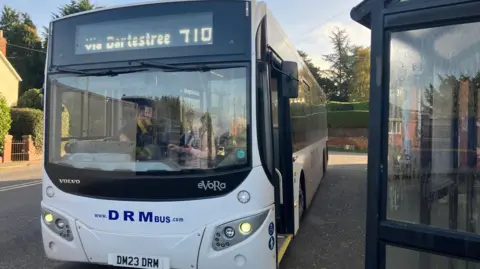
Graham Vidler, from the Confederation of Passenger Transport, which represents bus operators, tells us: “We accept that passengers face a mixed picture depending on where they live.”
He said better technology at bus stops was the responsibility of local councils but that many would struggle to find the money to upgrade them given their tight budgets and the fact there are so many.
“In contrast to the rail network, where there is a manageable number of stations, there are tens and tens of thousands of bus stops across the country.”
Louis Dyson, managing director of DRM Buses, which operates the route in Herefordshire that Janette and Doreen use, says the company had cut the route from hourly to two-hourly because of a drop in passenger numbers.
“If as much funding was given to support rural services, rather than making city buses run every 15 minutes, then perhaps there would be more options for the public,” he says.
Dyson says that when buses were running late it was usually caused by bad traffic, roadworks, bad weather and a lack of bus lanes – factors outside of drivers’ control.
And in response to claims that passengers can’t always view accurate information about when DRM’s buses are arriving, he says vehicles have ticket machine tracking software but that the rural location of services interfered with their connectivity.
Dyson says the service that Janette and Doreen regularly take would be changing to hourly “in the next month or two” if it gets approval from officials.
For people like Janette and Doreen, that can’t come soon enough. For them buses are what give them their independence and a chance to see family and friends.
“We’re only asking for the service we had before to be reinstated,” says Janette. “Nothing more.”
Additional reporting by Jennie Dennett, David Spereall and Grace Dean.

